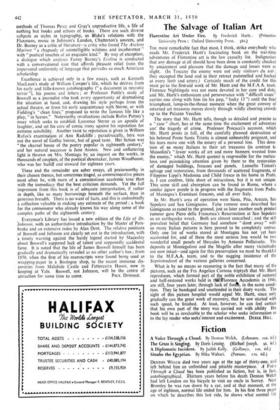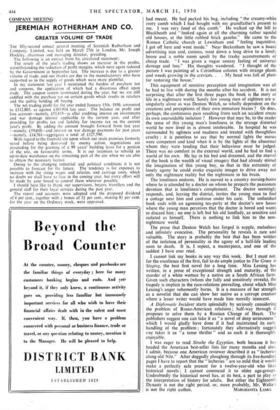Fiction
A Voice Through a Cloud. By Denton Welch. (Lehmann. los. 6d.) published as fiction, but is, in fact, autobiographical. .Thirteen years before his death Denton Welch had left London on his bicycle to visit an uncle in Surrey. Near Bromley he was run down by a car, and at that moment, at the age of eighteen, normal life ended for him. In his first three pages on which he describes this last ride, he shows what normal life DENTON WELCH died two years ago at the age of thirty-one, and left behind him an unfinished and pitiable masterpiece. A Voice Through a Claud leas been published as fiction, but is, in fact, autobiographical. .Thirteen years before his death Denton Welch had left London on his bicycle to visit an uncle in Surrey. Near Bromley he was run down by a car, and at that moment, at the age of eighteen, normal life ended for him. In his first three pages on which he describes this last ride, he shows what normal life
had meant. He had packed his bag, including " the creamy-white ivory comb which I had bought with my grandfather's present to me. I was very fond of this comb." He walked up the hill to Blackheath and " looked again at all the charming rather squalid old houses, at the little rubbed brick gazebo." He came to the Roman Catholic church at Lewisham and " feeling inquisitive, I got off here and went inside." Near Beckenham he saw a board advertising teas and, curious, went down a long drive to a lovely house and a noble room spoilt by the trashy accoutrements of cheap trade. " I was given a vague uneasy feeling of universal damage and loss." His thoughts wandered. " I thought of the picture I was painting of a Corinthian column with strange plants and weeds growing in the crevices. . . My head was full of plans for restoring the house."
This equipment of sensitive perception and imagination was all he had to live with during the months after his accident. It is not surprising that after the first three pages the book is the story of life in a nightmare world. Surely few young men of eighteen are st singularly alone as was Denton Welch, so wholly dependent on the creations and perceptions of their own immature brains ? Or does, perhaps, the continuous pain resulting from such an accident create its own unavoidable isolation ? However that may be, to-the reader the sense of this -young man's loneliness in the strange distorted world he now lived in is almost intolerable. In hospital he was surrounded by ugliness and madness and treated with thoughtless cruelty ; it is pointless to say that by normal lights the nurses were competent and kind when it is by the lights of the abnormal whom they were tending that their behaviour must be judged. There was no comfort in the external world, and he had to find a world of his own. He lay in his bed and dreamed, and the marvel of the book is the wealth of visual imagery that had already stirred the imagination of this young boy, so that in this extremity of lonely agony he could evoke exquisite images to drive away not only the nightmare reality but the nightmare in his brain.
The loneliness endures. He is moved to a country nursing-home where he is attended by a doctor on whom he projects the passionate devotion that is loneliness's complement. The doctor seemingly responds, and, leaving the district, invites the young man to find a cottage near him and continue under his care. The unfinished book ends with an agonising tea-party at the doctor's new house where the young man perceives that the doctor is bored and wants to discard him ; no one is left but his old landlady, as sensitive and isolated as himself. There is nothing to link him to the non- nightmare world.
The prose that Denton Welch has forged is supple, melodious and infinitely evocative. The personality he reveals is rare and valuable. The story is probably the best that has been written of the isolation, of personality in the agony of a half-life leading soon to death. It is, I repeat, a masterpiece, and one of the saddest I have ever read.
I cannot link my books in any way this week. But I must not, for the excellence of the first, fail to do ample justice to The Grass is Singing, the best first novel for a long time. Miss Lessing has written, in a prose of exceptional strength and maturity, of the murder of a white woman by a native on a South African farm. Given such characters (whom she fully and sensitively' reveals), the tragedy is implicit in the race-relations prevailing, about which Miss Lessing's anger vehemently burns. It is a measure of her strength as a novelist that she can show her native as a corrupt creature where a lesser writer would have made him morally innocent.
A Diplomatic Incident starts splendidly by seriously considering the problem of Russo-American relations ; half-way through it proposes to solve them by a Russian Change of Heart. The publishers suggest one can take it as " a novel of deep seriousness " which I would gladly have done if it had maintained its early handling of the problem ; fortunately they alternatively suggest cne takes it as "a tense thriller" and as such it is thoroughly enjoyable.
I was eager to read Sinuhe the Egyptian, both because it has headed the American best-seller lists for many months and also, I admit, because one American reviewer described it- as "lecheries along old Nile." After doggedly ploughing through its five-hundred pages I have to report that the " lecheries " are so mild that it would make a perfectly safe present for a twelve-year-old who likes historical novels ; I cannot commend it to older age-groups. Undoubtedly the historical novel has, at its best, a part to play in the interpretation of history for adults. But either the Eighteenth Dynasty is not the- right period, or, more probably, Mr. Waltati







































 Previous page
Previous page